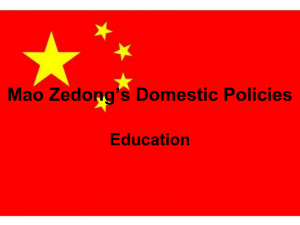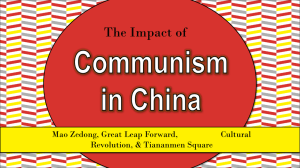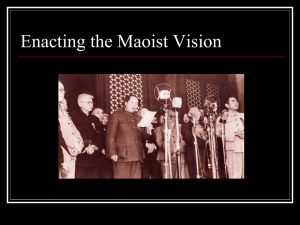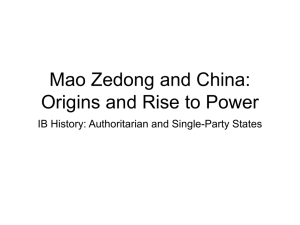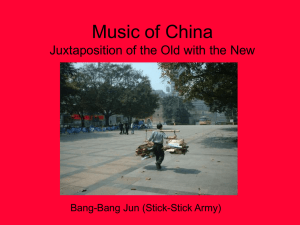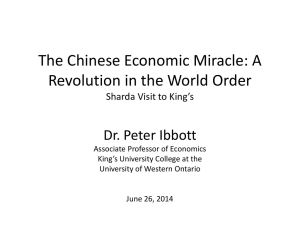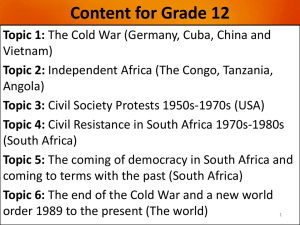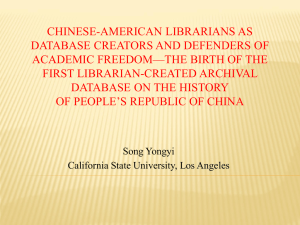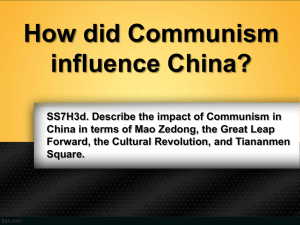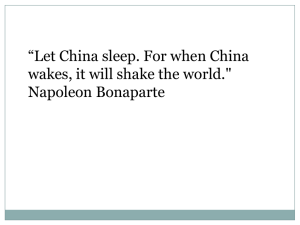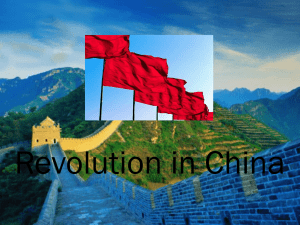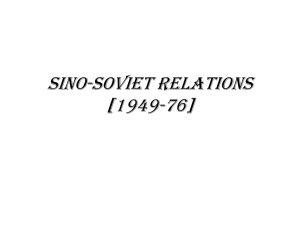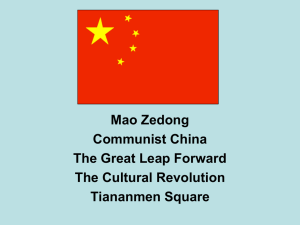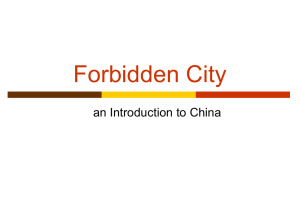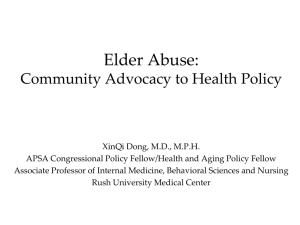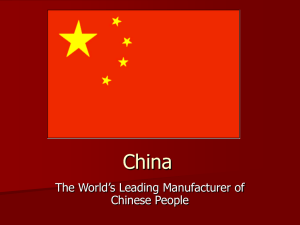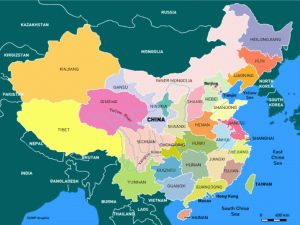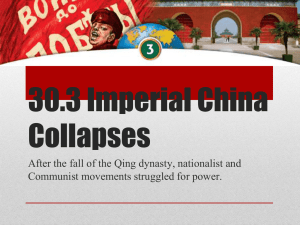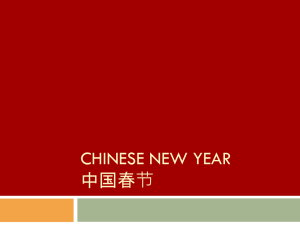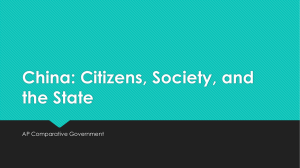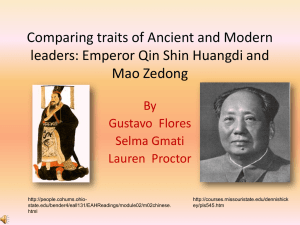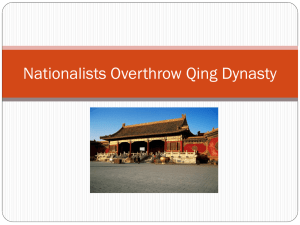BOOKS ON CHINA YOU SHOULD READ
advertisement
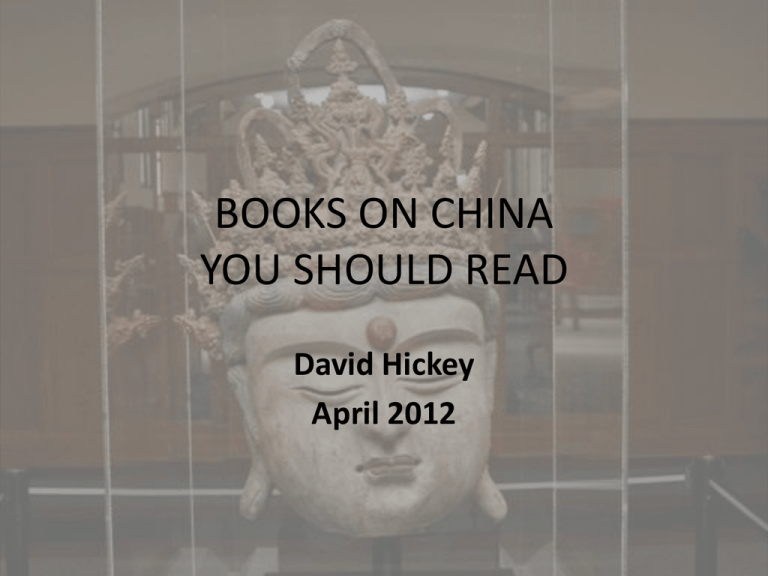
BOOKS ON CHINA YOU SHOULD READ David Hickey April 2012 Social/Political Background; Contemporary Life (1994): It's what you would call a journalistic "sweeping" book - each chapter takes on a different aspect - Communism, capitalism, the peasants, the intellectual life…. “Our Celestial Emperor possesses all things in prolific abundance,” Emperor Qianlong declared to Lord Macartney in 1793, explaining China‘s refusal to trade with the West. Ever since, Chinese have agonized over the merits of contact with the West. Some of them, like Mao, boasted of self-reliance, and those who took up his mantle wanted to believe that China could advance on its own, with limited foreign assistance. They were embarrassed, humiliated, by their country’s mood. They disparagingly called it chongyang meiwai 崇洋媚外 -- worshiping the West and fawning on foreigners. Personal Account (1988): Recounting a terrifying chapter in twentiethcentury history, this book is also an astounding portrait of one woman's courage. By the middle of December 1966, winter came in earnest. A penetrating north wind swept the city with icy blasts. The window and door of my unheated cell rattled with each gust. I had on both my sweaters and a padded jacket, but still spasms of shivering shook my body. In the icy room, my breath made white, cloudy puffs, and I had to stamp my feet and rub my hands to bring blood to my toes and fingers. Something mysterious was happening outside. As winter turned to spring, I learned that Shanghai was in a constant state of upheaval. One day the newspaper ran a statement attributed to Defense Minister Lin Biao: ''Let us not exaggerate the seriousness of this situation. Many people have committed suicide or been killed. But these deaths are fewer than those incurred during the war against Japan or the Civil War, or even during natural disasters.'' These callous words made me sick with apprehension for my daughter Meiping's safety. Modern History Family Chronicle (1992): Bursting with drama, heartbreak and horror, this extraordinary family portrait mirrors China's century of turbulence. Chang's meticulous, transparent prose radiates an inner strength. If there’s one historical book to read to gain an understanding of modern China, this is the one. On the first night, he did not want to go into the wedding chamber. He went to bed in his mother's room and had to be carried in to his bride after he fell asleep. But, although he was a spoiled child and still needed help to get dressed, he knew how to 'plant children,' according to his wife. My grandmother was born within a year of the wedding, on the fifth day of the fifth moon, in early summer 1900…. When he asked my grandmother if she would mind being poor, she said she would be happy just to have her daughter and himself: 'If you have love, even plain water is sweet.’ Women’s Studies (2002): The stories cover many aspects of women’s lives in China, from marriage and children to rape and sexual abuse, from religion to mental illness, from love to suicide. Xinran’s writing is always engaging, and the stories are gripping even when they are tragic. Chinese women had always thought their lives should be full of misery. Many had no idea what happiness was, other than having a son for the family…You have to understand that emotions and ideals such as happiness or equality are luxuries for the poor. First they want clean water and electricity; then washing machines and fridges; after that it's time for happiness. Listening to me, they discovered the possibility of another kind of life and began to question themselves, 'Why don't I have that?' Travel Writing; Non-fiction Storytelling (2001): Whether he is dealing with local characters, Chinese history or the natural landscape and the many ways they intersect and impress their identity upon him, there’s something reasonable and true about Hessler’s subdued tone that grows on you page after page. Fuling is located at a junction between the Wu and the Yangtze Rivers, one blue and clear, the other a dirty brown, meeting like two slivers of painted glass. The Yangtze in its size and majesty seems to be going somewhere important, while the Wu in its narrow swiftness seems to have come from some place wild and mysterious; and the faint forms of its distant hills suggest that the river will keep its secrets. You can fish all day long and the Wu will give you nothing. Commentary/History (2006): One of the most readable accounts of China today: tales of everyday people that the New Yorker Magazine ‘s Beijing Correspondent interweaves with stories of China’s archaeological history. Strikes an aesthetic balance between the personal lives of individual Chinese and the physical and historical spaces they inhabit. Jiang Wen, a Chinese actor/director, said to me, ‘….Everybody is too busy; there's not enough quiet for reflection. In the distant past, the country was peaceful and stable, but now it changes so fast. Certainly that's been the case since Reform and Opening, but to some degree the past two hundred years have been like that. We don't know where we are. We haven't found our road. In the early part of the twentieth century, some Chinese tried to find it in our own traditions, while others looked outside the country. This debate is still going on.’ Travel (1988): Part history book, travel guide, and part adventure memoir, here is China by rail, as seen and heard through the eyes and ears of one of the most intrepid and insightful travel writers of our time. The rare quality of the terra-cotta warriors is that, unlike anything else on the tourist route in China, they are exactly as they were made. They were vandalized by the rebellious peasants in the year 200 B.C., when these people invaded the tomb to steal the weapons -- crossbows, spears, arrows, and pikestaffs (they were all real) -- that the clay warriors were holding…. The warriors are the one masterpiece in China that has not been repainted, faked, and further vandalized. If they had been found before the Cultural Revolution instead of after it, they would undoubtedly have been pulverized by Red Guards, along with all the other masterpieces they smashed, burned, or melted down. WWII History (1997): A powerful work of history and moral inquiry. Chang takes great care to establish an accurate accounting of the dimensions of the violence. If the dead from Nanking were to link hands, they would stretch from Nanking to the city of Hangchow, spanning a distance of some two hundred miles. Their blood would weigh twelve hundred tons, and their bodies would fill twentyfive hundred railroad cars. Stacked on top of each other, these bodies would reach the height of a seventy-four-story building. History of the Communist Party (2007): Gripping retelling of an amazing historical adventure, an eye-opening account of how Mao manipulated the event for his own purposes, and a beautiful document of a country balanced between legend and the truth. I set out in October 2004, exactly seventy years after the Chinese Communist Party and the 1st Army abandoned their base in Jiangxi and began their escape from the Nationalists—the Long March as it became known. From Beijing I took the train, eighteen hours due south, and then after two hours more by bus through green-clad mountains and hills I found myself in Taihe in southern Jiangxi. It was a big town, with a grand new avenue, beautifully surfaced and complete with modern lighting—not many buildings yet, but looking for twenty–first–century growth. Modern History (1968): This journalist treatment has been called the "scoop of the century.” It clearly played a role in swaying Western and Chinese opinion in favor of Mao. Perhaps the most important role the book plays today is to recapture the spirit of revolutionary enthusiasm which Snow saw and reported. Nearly every province in China was represented in the various Red armies. In this sense it was probably the only really national army in China. It was also the ‘most widely travelled!’ Veteran cadres had crossed parts of eighteen provinces. They probably knew more about Chinese geography than any other army. On their Long March they found most of the old Chinese maps not useful, and Red cartographers remapped many hundreds of miles of territory, especially in aboriginal country, and on the western frontiers. Mao Thought (1966): English translation of Chairman Mao’s Little Red Book. The most printed book in the twentieth century, 427 quotations are divided thematically into 33 chapters. All men must die, but death can vary in its significance. The ancient Chinese writer Szuma Chien said, ‘Though death befalls all men alike, it may be heavier than Mount Tai or lighter than a feather.’ To die for the people is heavier than Mount Tai, but to work for the fascists and die for the exploiters and oppressors is lighter than a feather. ‘Serve the People’ (Sep. 8, 1944), Selected Works, Vol. III, p. 227. Memoir/Biography (1994): An account of the political intrigue within Communist Party leadership, excessive use of propaganda (like putting rice fields near railroad tracks), as well as Mao's excitement after President Nixon's visit to China, around the time his health started to deteriorate. It also details Mao's alleged personal depravity and sexual politics. ‘Chairman, you called for me?’ Mao struggled to open his eyes and move his lips. The oxygen mask had slipped from his face, and he was struggling for breath. I leaned over. "Ah ... ah ... ah" was all I could hear. As Mao's personal physician, I was in charge of the medical team-16 of China's best doctors and 24 excellent nurses--trying to save his life. For more than two months, since his second heart attack, we had been on duty around the clock. Shortly before midnight on Sept. 8, 1976, the doctors administered an injection of a traditional Chinese herbal concoction, consisting primarily of ginseng, to stimulate Mao's heart. His blood pressure rose and his pulse firmed up. Biography (1999): An elegant and succinct account by the Yale Sinologist, writer and historian, of the enigmatic, complex and perhaps all too tragically human Mao Zedong. Mao Zedong was born in a sprawling courtyard house with a tiled roof in one of these farm villages, called Shaoshan, about thirty miles south and slightly west of Changsha. The exact date was December 26, 1893. He began to work on his parents' farm at the age of six, and after he was enrolled in the village primary school at the age of eight, he continued to do farm work in the early mornings and in the evenings. Their farm was small by Western standards, around three acres, but in that area of Hunan such a farm was considered a decent size, more than enough to support a family if well managed. Epic History (1990): Spence’s most famous book, it has become one of the standard texts on the last several hundred years of Chinese history. For China’s leaders in the 1980s, as for those across the previous four centuries, political protest and the desire to share in the act of ruling remained either a proof of disloyalty or a harbinger of chaos. But such attitudes would have to change in the 1990s [and 2000s] if China were not to be trapped in a new cycle of impoverished helplessness. The gleaming yellow roofs and spacious marble courts of the Forbidden City still stood in place, but they now reverberated in a new kind of challenge from the great open space that stretched in front of them. There would be no truly modern China until the people were given back their voices. Pre-Modern History/Biography (1975): Here in colloquial language is the great K’ang-shi, Emperor of the Ch’ing (Manchu) Dynasty from 1661 to 1722 speaking in his own words. This is both a feat of scholarship and a literary achievement. It is when one is beyond the Great Wall that the air and soil refresh the spirit: one leaves the beaten road and strikes out into untamed country….It may be the height of summer, but some of the trees are turning yellow already, as if it were late autumn; you have to wear a fur jacket in the mornings, even though in Peking it is so hot that you hesitate about having the eunuchs lead the consorts out of the palaces to greet you on your return. History/Historiography (2005): An opinionated, absorbing standard history, the authors ponder at length the great advances in China circa 1000-1500 -and of China's failure to fall in line with the industrial revolution that catapulted the West into prominence. Partly because the warlord era from 1916 to 1927 was a low point of state power, it was paradoxically a time of considerable achievement along cultural, social and economic lines. The relative freedom of this new growth would contrast with the bureaucratic control that would be re-imposed upon China after 1927. The contrast would highlight two themes that continued during China’s era of party dictatorships. One theme was authoritarian statism…putting political unity above all. The other theme was cultural creativity and social improvement as part of a process of civil growth. This theme was evident in autonomous developments not under direct control of officialdom in China’s adaptation to the modern world. They did not, however, offer much promise of a unified state power. Historic Survey (1986): Gathers together a lifetime of scholarship, plus he has a true gift for presenting complex issues and a fine eye for telling illustration. A book by the Dean of American Sinology, it will be widely read for decades. China’s revolution since 1800 has been a struggle to break the grip of the past. While this is true of most revolutions, almost by definition, it has been a major problem in China for the reasons of historical continuity and distinctive culture. For example, the Cultural Revolution was specifically targeted on the ‘four olds’: old culture, thought, habits and customs). These deep-lying cultural traits and values were viewed by Mao as elements that had held China back. One need not support Mao’s methods to appreciate his aims. Foreign Relations/History (1968): The most famous and influential of all Fairbank’s scholarly tomes, it stands almost alone as a history of China, an analysis of Chinese society, and an account of SinoAmerican relations, all in brief compass. How far Mao has shown originality in applying Marx-Leninism to the ‘concrete realities’ of China is perhaps a rather academic question. Every translator of ideas from one culture to another must be to some extent an innovator, in the mere act of translation; in transplanting a mode of action, he must be all the more creative, in practice if not in theory. Government/Politics (2003): One of the best guides to the way in which China is governed; or perhaps more precisely, the way in which China is run, since government is only part of the picture. In a system geared to governing all major aspects of economic and social life, there is virtually no way to rule effectively without both vertical and horizontal bureaucratic domains. The leaders’ determination that the Communist Part dominate the system adds further complexity to the bureaucratic leviathan. Western scholars of organizational dynamics term this crosshatching of horizontal and vertical lines of authority a ‘matrix ‘ problem, and all largescale organizations must deal with matrix issues. Since China has developed the largest bureaucracy in the history of the world, its ‘matrix muddle’ is of unprecedented scale. Politics (2008): A must-read for anyone attempting to understand the last decade’s events in China and that nation’s future trajectory. Focuses on political maneuvering among the top leadership, and deep political conflict among the intellectuals. The violence of June 4 stunned China’s intellectual community. Although reflections and introspections began almost immediately, it would be over two years before intellectuals began to regain their voice, and when they did, it was not only a different voice that emerged, but also a very changed and divided community. Chinese intellectuals would reemerge in a very different society, and their reactions to the surrounding socioeconomic and political events polarized them in a way not apparent in the 1980s, or even, perhaps, before. This silence and general irrelevance…contrasted vividly with the turmoil among the political elite. Journalist Account (2008): A number of foreign correspondents have returned from China in the past 20 years and written books attempting to put a human face on the giant. Many are good, but for readers interested in fundamental political questions, this one stands out. Pan, Washington Post bureau chief in Beijing from 2000 to 2007, has put together human stories with a political meaning. By almost any measure , the country’s last twentyfive years [1983-2008] have been the best in its five-thousand-year history. But the Chinese people have not yet escaped Mao’s shadow. A momentous struggle is underway for the soul of the world’s most populous nation. On one side is the venal party-state, an entrenched elite fighting to preserve the country’s authoritarian political system and its privileged place within it. On the other is a ragtag collection of lawyers, journalists, entrepreneurs, artists, hustlers, and dreamers striving to build a more tolerant, open and democratic China. Republic of China History (2008): A brief, concise yet detailed iconoclastic book arguing that the great Communist Party myth that all was terrible, corrupt and backward during the Republican period is inaccurate. An antidote to the many book treatments that glorify the 1949+ break from the past. Open governance , participatory politics and political diversity were far more significant in the decades before 1949 than has usually been accepted. China before communism was not a model republic, as it suffered from government crises open for all to see, but it was politically more democratic than many comparable regimes in Europe at the time, or than the People’s Republic has been. History; Commentary (2006): A professor at Cambridge and translator, Lovell uses the Chinese tendency for wall-building and xenophobia as a metaphor and vehicle to understand Chinese history and character. In its efforts to police the Internet, the Communist Party realized that if it were to meet Clinton’s challenge [to them] of [a web crackdown being as slippery as] ‘nailing Jell-O to the wall’, it would first of all need a wall against which to work. Between 1996 and 1997 a new department at the Public Security Bureau devoted to infringing Internet liberties set about constructing the ‘Great Firewall of China’. A sprinkling of servers guarding the five gateways at which the Chinese Internet met that of the outside world, the Firewall was programmed to block sensitive sites from abroad….Five years later, the Firewall had been further armed with ‘packet sniffers’, software able to detect officially problematic words and phrases in web pages and emails. Business/Culture Studies (2005): A compelling tale of doing business in China's opening economy during the 90's. The quintessential culture-clash, and a must read for anyone working in China, it gives great insights into the implications of language, culture and history in the work place. The Tsingtao Brewery was the first PRC company ever to raise capital on Hong Kong’s stock market when, in 1993, it netted an equivalent of sixty-five million bucks. Shortly afterward it came out that Tsingtao’s management had taken the cash, and instead of investing it in the brewery as they had promised, had lent it to their friends—who happened to be property developers. Investors were outraged, but there was little that they could do as the management retreated to Tsingtao and ignored the furor. However, the central government was embarrassed by the scandal, and eventually the Tsingtao municipal government kicked out the old management team. Social/Cultural Studies (1998): This scholarly collection of essays provides no better introduction to contemporary China, and there are few more entertaining, vivid, and stimulating accounts of shifts in cultural life and politics. As a pseudo-religious site of the nation throughout the Cultural Revolution, Hunan’s Shaoshan, Mao’s birthplace, constantly had between 1 to 2 million visitors annually. Mao’s death and the shift to economic reform saw the number of visitors drop precipitously….the revolutionary heritage of the village as a theme for tourism culminated in the 1994 construction of a massive ‘Mao theme park’ costing close to $6 million US, and built directly opposite the home in which he (now a small ‘h’) was born. With the ‘fun’ put back into the revolution, tourists returned….coming not to worship Mao but to consume him….Part ‘stations of the cross’, part side-show, it attempts to make revolution the ‘theme’ of a scenic park. Above: 2006 “Balance Sheet” on China’s economic challenge to the United States. Left: 2008 expose of the private entrepreneurs partnering with the Party . Honorable Mentions among the books on current economics and politics. Above: 2000 volume explores social, political and cultural strife amidst the reform efforts. Left: 1989 seminal study on a local village organization and ethnography. Honorable Mentions for books on modern society Above: 2004 bilingual dictionary, with radical index for ease of look-up. Left: 2007 provocative argument reveals the flaws in contemporary views of China and the international relations of East Asia, and offers a new understanding of the importance of sound U.S. policy in the region. A book on Foreign Relations, and the best English-Chinese Chinese-English Dictionary (Oxford University Press) Excellent guides for writing and recognizing characters Vital documents for Chinese cultural studies I Ching and the Taoist Classics Translations of the greatest Chinese literature : Tang poems in a 2003 bilingual classic poetry anthology, and a 1998 abridged “Hong lou meng” Representative works by arguably the greatest modern writers, Lu Xun and Mo Yan The two most famous and well-regarded books on China written in the United States for the American audience, both from the 1930s Three acclaimed works by a popular ex-pat author who now teaches at Boston University Darkly humorous contemporary tales, and one of the best guidebooks ever (the 2011 Lonely Planet China: Country Travel Guide is the 12th edition)…. Three well-received 2011 books on China: The Party / McGregor; Dreaming in Chinese / Fallows; China in Ten Words / Yu Hua
